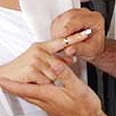
A proposed law raising the legal marriage age from 17 to 18 has stirred up a serious controversy between those for and against the bill. Opponents of the measure claim that there is no evidence that marriages between minors are doomed to failure, while proponents see such marriages as a cause of physical and psychological damage to young girls.
A Knessed session on marriages between minors was held Tuesday, preceding Wednesday's preliminary reading for the law proposed by Zahava Gal-On (Meretz) and Michael Melchior (Labor).
The bills' opponents claim that 17 is quite a mature age for marriages.
The Shas party, whose members are in opposition, insists that "the current age answers the need for balance between a person's maturity and preparedness for marriage, and additional education will only strengthen a marriage's chances for success."
Traditional perceptions
Marriages between minors are especially common in Israel among the Caucasian, Georgian, Breslaver, and Arab communities.
Attorney Sonia Bulus from the Association for Civil Rights in Israel addressed a letter to the Knesset in which she wrote that "the phenomenon of young marriages is strongly tied to stereotypical perceptions by which the woman's natural place is in the home and her principal work is to give birth and raise children."
Bulus pointed out that "many of the marriages which began when the wife was a minor are subject to great difficulties and a large number of them end up on the rocks. Marriage at a young age causes physical and psychological damage to young women. In the vast majority of these cases, the young bride becomes pregnant directly after the wedding ceremony."
Contrary to this view, Shas holds the legal opinion that "the current order must be maintained. A legislated change is not the best way to bring about a different situation. Instead of wasting efforts searching for a solution in all the wrong places, we should be investing in education to prepare people for married life."
It is yet unclear just how many female minors are married in Israel every year. The Association for Civil Rights in Israel pointed out that "accurately measuring the phenomenon's dimensions is extremely difficult as many instances of underage marriage are initially carried out in an unofficial capacity, to be registered officially only later when the bride is 17."
Missed opportunities
Liron (not her real name), 22, from the center of the country, was married at the age of 17 and divorced half a year ago. Liron, who comes from a religious family and left the fold about a year ago, said that the marriage was the only way for her to gain independence.
"I always wanted to get away without being restricted and that was the only path I saw. Now I understand that it solves nothing."
According to Liron, the mother of a two-year old child, she was happy with her newfound independence after being married, but soon understood that her chosen husband did not suit her and relations between the two deteriorated until they were divorced.
"I failed to take into account the possibility of being left alone with a child. There are many things I can no longer do. I would like to serve in the army and study, go out and travel, but those are no longer options," she said.
Amnon Meranda contributed to this report















